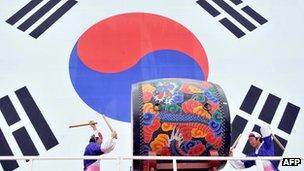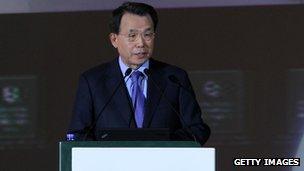A green shoot in the economic mire
- Published
- comments

South Korea is investing $85bn in green growth
I know; it's terrible everywhere.
Economic gloom from Brest to Brastagi. The US so deeply in debt that it's hard to see President Obama's nose poking over the edge of the pile of IOUs.
Smog-bound in Beijing, parched in East Africa, drenched in Bangkok, isotope-laden in Japan. Energy prices rising, natural disasters increasing; and the western world too bound up in debt to do much about it.
If you like your analogies cinematic, this is our version of the bleak landscape confronting the Pixar robot Wall-e as he zips around on his fruitless, endless, pointless tidying-up mission.
If you've seen the movie, you'll know that eventually the fate of Wall-e and indeed the entire remaining human race is transformed by the discovery of a single green shoot.
An analogy for our times?
There are of course myriad analyses out there of the current economic and environmental crises.
And much promoted as something that can solve both in one fell swoop is "green growth".

Han Seung-soo is spearheading South Korea's green growth
In a quote that encapsulated the issue as neatly as I've seen it done, UK climate minister Greg Barker said last year: "What's holding the climate talks back is one question, and it's the same question whether you're a senator in Illinois or an MP in India or any European country.
"Fundamentally, it is whether a transition to a low-carbon economy is compatible with continued economic growth; and no-one knows the answer, because no country has made the transition yet."
If anyone's going to show whether the transition can be made succesfully, it's likely to be South Korea.
When the Fannie May/Freddie Mac/Lehman Brothers chapter of the economic crisis struck, many countries announced economic stimulus packages.
In environmental circles, South Korea was widely applauded for directing $85bn of its package towards "green growth" initiatives.
It also founded a Global Green Growth Institute, external (GGGI) headed by former prime minister Han Seung-soo to research and develop approaches.
Former South Korean PM Han Seung-soo on the Global Green Growth Institute
This is not an academic exercise.
In partnership with other countries, using expertise from anyone who wants to contribute, the GGGI aims to develop real strategies that can be used on the ground to change the economic paradigm - and with it, humanity's environmental prospects.
At the UN climate convention meeting here, I caught up with Dr Han and asked him to talk me through South Korea's reasoning, what "green growth" means in different countries, and what the prospects are for agreeing something meaningful on it at the Rio+20 summit next year.
Though the UN is firmly behind green growth, it's clearly a work in progress, as you'll hear.
I'd intended to write quite a bit more about green growth for this post; but as I type away in the BBC's booth in the converted car park that is our home for the conference, events here appear to be hotting up.
So that's it from me. The rest of the words are Dr Han's - which is good, as he knows far more about it than I do.